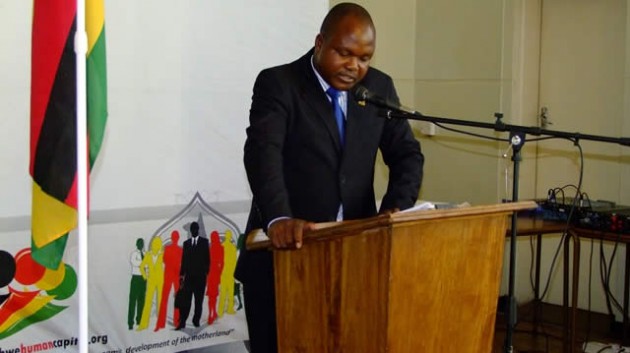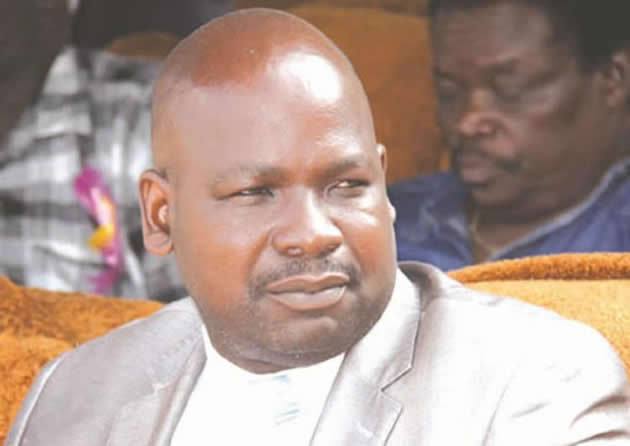Jobs deal for Zim graduates• Labour exportation agreements sealed • Govt working on database, says minister


Higher and Tertiary Education, Science and Technology Development Deputy Minister Dr Godfrey Gandawa
Felex Share Senior Reporter
Government is inviting all those who graduated from tertiary colleges since 1980 to forward their names for possible employment in several African countries with which it has signed agreements for labour exportation.
Higher and Tertiary Education, Science and Technology Development Deputy Minister Dr Godfrey Gandawa said yesterday that a database of the graduates was being created for possible job placements both abroad and locally when opportunities arise.
He said the Government would financially benefit from the arrangement as the receiving countries would pay a certain amount, as well as cater for the welfare of the exported staff.
The development was well-received by teachers’ unions who said apart from commercially benefiting the Government, the move was a promotion of “brain circulation” on the continent.
Brain circulation benefited countries like India, which witnessed a large-scale deliberate emigration of engineers from its premier engineering institutes in the 1960s, only for them to return in the 90s as prospects improved markedly.
The Asian countries’ massive development is also attributed to this circular movement of skilled labour.
With Zimbabwe faced with an unemployment rate of 11 percent, according to the latest Zimbabwe National Statistics Agency report, many countries in Africa have expressed interest in recruiting local graduates.
Dr Gandawa said Government had seen it fit to assist thousands of jobless graduates, while it worked on various ways of creating employment as espoused in its economic blueprint, Zim-Asset.
“We are coming up with a policy as a Ministry to help our skilled manpower get jobs because there are countries with vacancies in various fields, but our people do not have access to those vacancies out there,” he said.
“As a ministry, we have taken the initiative to look for the jobs in those countries. We are still developing our human export policy and we have already signed memoranda of understanding with countries like South Sudan, Botswana, Angola and Namibia on that.”
Dr Gandawa said they were working on the human export policy in collaboration with the Ministry of Labour, Public Service and Social Welfare and the Civil Service Commission.
“The companies or Governments employing will pay us if the policy comes to be, while workers will earn their salaries there,” he said. “In that way, Government will recoup its investment in human capital.”
Dr Gandawa said the database they were creating would include all the people who have graduated from the country’s tertiary institutions and those trained abroad since 1980.
“With this databank, we will get to know where our graduates are and how they are doing,” he said.
“We have not been tracking where they are.”
The Government yesterday flighted an advert in the press requiring the graduates to register for the database creation.
“All those who graduated from universities, polytechnics or teachers college in Zimbabwe or graduated from any other university outside the country and working in or outside Zimbabwe should register with the Ministry of Higher and Tertiary Education, Science and Technolgy Development,” read the advert.
“Registration forms are accessible at the ministry’s head office in Harare or at any university, polytechnic or teachers college in your province.”
The forms can also be downloaded from the ministry’s website: http//www.mhtestd.gov.zw.
Countries like Cuba make money from exporting health staff to other countries and there are a number of doctors working in Zimbabwe from the North American country.
It has emerged that countries like South Sudan and Namibia need professionals like teachers, engineers, pharmacists and administrators from Zimbabwe.
Zimbabwe Teachers Association of Zimbabwe chief executive Mr Sifiso Ndlovu yesterday described the idea to export human capital as noble.
“It is a good move as long as it is a Government to Government arrangement because we will get remittances for exporting labour,” he said.
“That circular movement brings tangible knowledge that will in the future be valuable for the country’s development. By doing this, we are upgrading and making useful our human capital.”
Zimbabwe’s universities churn out more than 10 000 graduates every year with thousands more coming from polytechnics, teachers colleges and other institutions of higher learning.











Comments